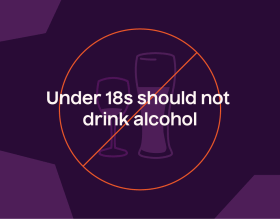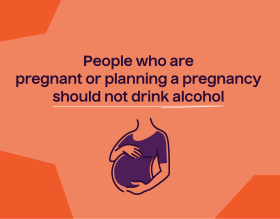
Standard drink tool
A standard drink might be less than you think. Use the standard drink tool to see how many drinks are in your typical pour.
Alcohol is a drug that suppresses the central nervous system. It slows down the functions of the brain, impacting the way you think, feel, and act. There is no safe amount of alcohol for brain health.
Alcohol is classified as a depressive drug because it slows down communication pathways in the brain. At the time of drinking, alcohol use can increase the risk of injury from falls, assault, road crashes and drowning. In the long-term, alcohol can cause brain impairment which can lead to a range of problems.
Short term effects | Long term effects |
|---|---|
Learn more about short term harms. |
Learn more about long term health effects. |

The brain goes through important changes during puberty and continues to develop until around age 25, making it more sensitive to damage from alcohol.
Exposure to alcohol while the brain is still developing can lead to long term emotional problems and difficulty with learning, planning and memory.
Health experts recommend that children and people under 18 should not drink alcohol to reduce the risk of injury and other harms to health.
Alcohol reaches all areas of the brain. Learn more about how different parts of the brain are affected by alcohol and how this can impact the way you think, feel and act.

A baby’s brain begins developing early and continues throughout pregnancy. There's no safe time or amount of alcohol to drink during pregnancy. Women who are pregnant or planning a pregnancy should not drink alcohol.
A baby’s brain keeps developing after its born, which means the brain is still sensitive to damage from alcohol. Choosing to not drink alcohol is the best option for a mother and baby when breastfeeding.
Page last updated19 January 2026